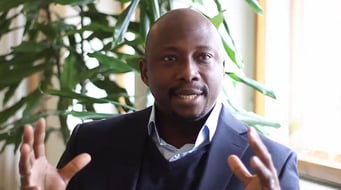 During the Inaugural Cesim Instructor Workshop 2016, we strived to create more effective learning experience for students and share simulation teaching experiences among educators of different institutions and countries. Each instructor took turn to express their expectation from the Workshop before the in-depth discussion and ideas exchange began. One of the very popular interests in business strategy games teaching among educators was, how do other instructors use simulations in their courses and institutions? In response to this popular request, we will introduce the business simulator game module practice of Adewale Adeyemi at Coventry University in this blog post.
During the Inaugural Cesim Instructor Workshop 2016, we strived to create more effective learning experience for students and share simulation teaching experiences among educators of different institutions and countries. Each instructor took turn to express their expectation from the Workshop before the in-depth discussion and ideas exchange began. One of the very popular interests in business strategy games teaching among educators was, how do other instructors use simulations in their courses and institutions? In response to this popular request, we will introduce the business simulator game module practice of Adewale Adeyemi at Coventry University in this blog post.On adopting Cesim business games
When asked how he first became interested in business simulator games, Mr. Adeyemi said that he was a part-time lecturer in the main campus at Coventry University, and business games was then used as a component in a strategy module he was involved in. As his colleague on campus, a Cesim simulations user, introduced Cesim to him, they found out the learning outcomes that they could achieve using Cesim business management games on their module could be, "extremely extremely valuable," he said, so they decided to adopt it on the module.
| "Simulation makes it scalable to different learning outcomes, to different audiences, and to different experiences" |
Since then, Mr. Adeyemi has been using Cesim business simulation games for 7 years. "Over the past six years, I've gotten to learn more and more about different tools on the aspects of the simulation that makes it scalable to different learning outcomes, to different audiences, and to different experiences."
He continued to share his experience of utilizing the scalability and customization options of Cesim business games in his teaching at Coventry University, "Because of this scalability, and the possibility within the tool to achieve learning has made us constantly go back to it, put it in different modules... the feedback we get from students about how much learning they achieve by engaging the simulation has made it such that, for us now, it's like the module can't be better without a simulation element inside of it."
On using Cesim in a MBA program
| "That makes what we do very very special at the London Campus of Coventry University." |
Mr. Adeyemi has a different way of using serious games comparing to his peers. "Most of the colleagues I have worked with, they use business simulations as part of the module, so it just contributes as an element to the module. But what I do is, I use it as a standalone module, and I design a lot of learning around the simulation experience." His method incorporates business simulator games more than it being a part of the module, "It is now what my students use as an end-of-program project."
He explained how business games provide the opportunity for students to put theories into practice, "Rather than MBA students writing traditional dissertations, which is academic research focus, we now engage them in the business simulation from an applied research focus perspective."
How does he combine academic and practical business skills in the MBA program specifically?
"So what they do is, they run the simulation around a 10-week period, and then, they write a reflective report of 12,500 words over the 10-week period, and that represents their final project of the program. That makes what we do very very special at the London Campus of Coventry University."
On incorporating Cesim into assessment
According to Mr. Adeyemi, the module assessment in the MBA program at Coventry University comes from 3 key perspectives consisting of team engagement plan, mid business review, and final reflective portfolio.
| Adewale Adeyemi's Module Assessment | ||
| Before 1st round | After 4th round | |
| Team engagement plan | Mid business review | Final portfolio |
| 10% | 20% | 70% |
"When we set this module, set this simulation, students come into the teams, the first submission would be a kind of team engagement plan, which some other colleagues would just call, strategy for the business game."
He continued to elaborate on the second key perspective, "So they submit the team engagement plan, and then we would normally run about 8 rounds, so after the 4th round, there will be a team presentation of the various teams in the competition, which we call the mid business review. This way, students will reflect and do a presentation on what they have done in the past 4 rounds. Most importantly, in that review, is to tell us about their plan for the next 4 rounds."
The final key perspective in his module assessment is, "After the business review, they start to write individual reports on their engagement with the simulation over the next 6 weeks. So that produce a final portfolio of 12,500 words, which is the final submission." In terms of weighting in his module, 10% goes to the team engagement plan, the mid business review takes up to 20%, and the final portfolio accounts for 70% of the module grade.
On improving employability through Cesim
| "Our promise to the students is that we guarantee them the real business experience... and business simulations create that platform through which students can gain that level of work experience." |
When asked about the most important takeaways from his business simulators teaching experience, Mr. Adeyemi said, "At the London Campus of Coventry University, our promise to the students is that we guarantee them the real business experience."
He went on to illustrate how business strategy games allow students to gain practical business skills and experience, "One of our unique selling propositions is that, even if you don't have work experience, we will still take you on our MBA program. Incorporating business experience into our curriculum is to get students to have various experiences on the program that will represent what they can put on their CV as a kind of work experience, and business simulations create that platform through which students can gain that level of work experience."
Simulator games offer students the invaluable chance to learn the practical elements that one should acquire upon graduating from a MBA program, "Because it's about application of the various theories and concepts in the stimulated environment, that's one of the most critical parts for us."
On advice for educators new to simulations
"I think, first and foremost, is to think broadly about the capability of the tool, because it is so scalable that it can be adopted to any audience, any level of students, and you can actually scale it to achieve any level of learning outcome. Like I said, just keep being open-minded and engage the simulations with scalability in mind."
Expert Interview: Adewale Adeyemi on Cesim Simulation Games
Watch more Cesim expert interviews >>


